2014 Recap: Experimenting with the Open-World
2014 is almost done and dusted, so here's where the open-world took us this year.
This article first appeared on USgamer, a partner publication of VG247. Some content, such as this article, has been migrated to VG247 for posterity after USgamer's closure - but it has not been edited or further vetted by the VG247 team.
Back before E3, I talked about the potential of the open-world. It's a style of game that's near to my heart, and I tend to be the one who plays most of the open-world titles here at USgamer. As I said in that previous article, the open-world genre represents possibility to me. This year, the open-world genre got bigger, but it was also mired in problems new and old.
These titles drop players into a digital sandbox with a series of tools and objectives. A great open-world title lets players roam free and create their own play experiences. A number of games feature story-based campaigns, but the real core of the game is out in the area the game occupies, whether that's historic Paris, Mordor, or even Seattle. Gameplay is emergent instead of directed. In open-world games, things happen that are unique to each player; things they can share with friends, or online via YouTube, Twitch and Reddit.
Over the last generation, developers gained far more experience wit the building blocks of a great open-world game. They began to search for what's next, trying to find new horizons. Now that 2014 is over and we've seen what this year has to offer in the genre, it's time to look back and see where it's headed in the future. Each title pushed the basic concept of the open-world in different directions, so let's explore where these experiments took us.
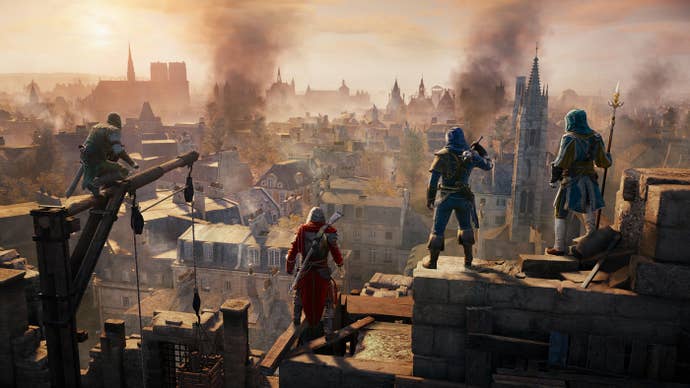
Connecting to One Another
Examples: Assassin's Creed Unity, Far Cry 4
Ubisoft has been a big believer in the open-world concept after the release of the first Assassin's Creed made bucketloads of money. This year, the company released four major open-world titles: Assassin's Creed Unity, Assassin's Creed Rogue, Far Cry 4, and The Crew. Whereas most open-world games have had competitive multiplayer experiences separate from the main game, Ubisoft decided to try something different this year: cooperative online. The Crew is essentially an MMO, while Unity and Far Cry 4 feature small-group cooperative multiplayer.
The online co-operative experiences in Assassin's Creed Unity and Far Cry 4 are an absolute blast to play with a trusted friend (random-roll doesn't always go so well) and the seamless nature of the multiplayer action is a plus. Being able to drop in for a quick mission with a partner expands the potential of those titles. One of the best open-world experiences I've ever had was the Just Cause 2 Multiplayer mod, which mixes the mayhem of single-player with a whole host of random players.
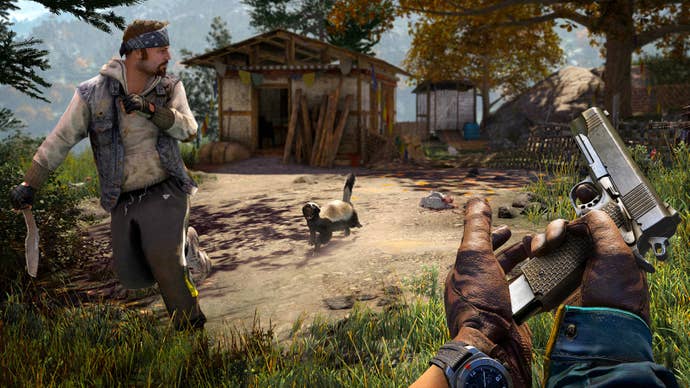
The problem is having significant online features means your online infrastructure and netcode needs to be up to snuff. Far Cry 4 has been plagued with online connection issues since launch, from problems starting online sessions to connections that mysteriously drop. Lost progress, items, and skills have also been reported. On Unity, one fix for framerate issues was to simply disable online play. My time in that game has also seen the occasionally dropped connection during a co-op heist. Both titles have since been patched into working order, but it's still a major problem.
Online is one potential direction for open-world games, but the early experiments had growing pains. Online play is a great thing and you can't fix all connection issues, but bringing some stability to the experience is paramount. MMO players might be used to it, but spreading the anger to everyone isn't a fix.
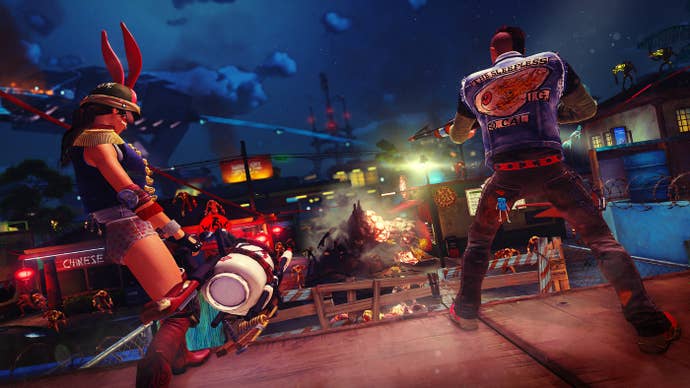
Put Your Own Spin on It
Examples: Assassin's Creed Unity, Sunset Overdrive
Previous open-world games had playable characters with a linear progression. As you play through the game's story, you gain more weapons and various upgrades to those weapons. Most endgame characters are largely the same from player to player.
This year, Assassin's Creed Unity introduced character customization to the franchise. While Arno had a specific starting point, players could take the character down different paths by equipping new gear, new weapons, and new skills. The idea was an extension of the game's online mode, but it worked rather well in the single-player campaign as well. Being able to customize Arno gives you a sense of ownership over the character that isn't present in previous Assassin's Creed games.
Insomniac Games took it a step further in Sunset Overdrive, allowing players to romp through Sunset City looking however they want to. Every clothing item in the game is gender-neutral, meaning you can wear that suit jacket with a cheerleader's skirt if the mood strikes you. Viking helmet, feather boa, and skinny jeans? Rock out. It's immensely freeing and I found myself more tied to the concept than I thought I would be.
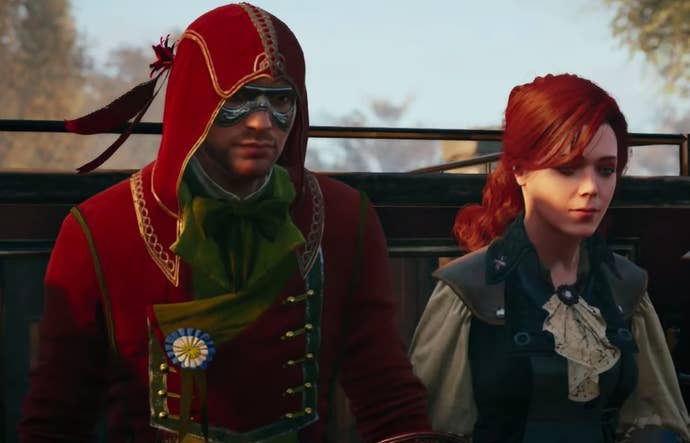
I had two problems with customization in Unity. The first was the fact that the stats on each piece of gear seemed a bit obscure. "Health" makes sense, adding HP to your character, but taking 40 percent off of Restricted Area Detection Time is a vague stat. What's the base time? What's the magnitude of the improvement? It was very unclear.
The second was my desire for the stats to be de-coupled from the visual look of each piece of gear, something Sunset Overdrive completely understood. I understand the reasoning - you can take the measure fellow Unity players at a glance - but there were occasional items that I liked the look of, but wasn't able to choose because the stats were completely out of line with the direction I was taking my character. Instead, I was stuck with this weird costume mask/hood combo.
As an experiment, customization was mostly a success and I'm looking forward to seeing it in more titles. Additional costumes is one thing, but allowing players the freedom to change the look and playstyle of their character goes a long way towards making the game wholly theirs.
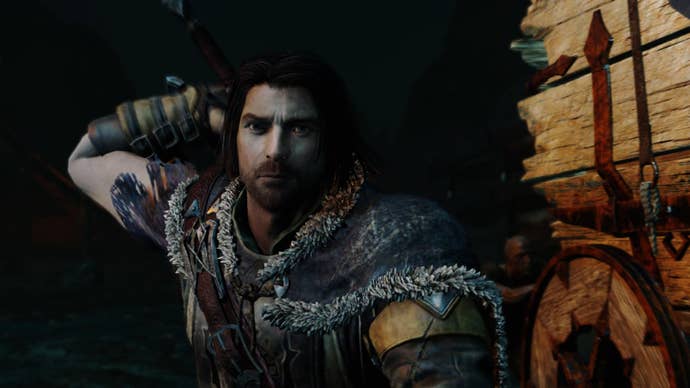
Creating New Stories on the Fly
Example: Shadow of Mordor
Middle-Earth: Shadow of Mordor was a surprising release. It came from Monolith, a developer with no experience in the open-world genre. It was an open-world action title set in J.R.R. Tolkien's Middle-Earth, a premise that seemed like a cheap cash-in. Depite the potential problems, Monolith released one of the best open-world titles this year. Even more surprising was the innovative Nemesis System, which procedurally generated new orcs for Sauron's Army.
Procedural generation isn't a new feature. Some games use it to generate levels, while others usse it to populate the milling crowds of their open-world environments. Monolith decided to use it to craft unique villains for Talion to take down on his way to Sauron. Every player has their own, unique group of orcs to take down, their own foes they come up against again and again. These enemies remember who you are after each encounter; they remember the successes and failures of their ongoing war against you. Sure, their names, looks, personalities, strengths, and weaknesses are chosen at random from a preset list, but the game provides you with the illusion of a living group of foes.
The Nemesis System worked so well that even Bioshock Infinite director Ken Levine thought it was the business.
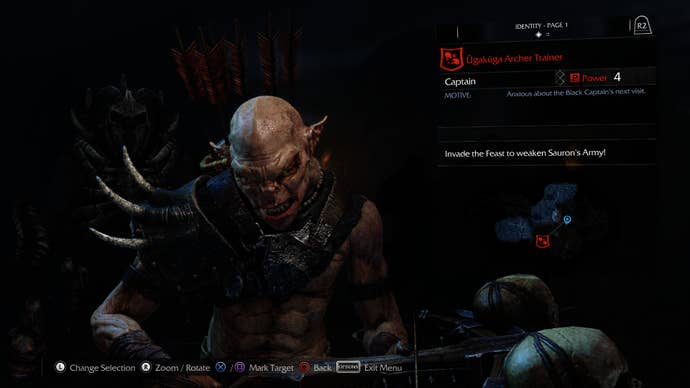
"I've directed two video games whose themes tangentially touch on a lie writers like me tell our players: that, when it comes to what they do in a game's story, they have a choice," wrote Levine in an article on Medium. "Yes, there are traditional story elements in the game. But that story pales in comparison to what the players, through the tools the game provides, build for themselves simply by playing the game. By breaking down the elements of character into small chunks and re-combining them based on randomness and, more important, responses to the player's choices, Shadow of Mordor tells a story that could never exist in another medium."
"I think Shadow of Mordor is the first "open narrative" game. You're not just checking off missions in a variable sequence. You're changing the dramatis personae. Whenever you succeed or fail, the characters in the story respond to your actions, and not in the manner of a branching "choose your own adventure." It is an excessively simple, yet impressively flexible, crime story."
Sure, the Nemesis System had some issues; especially in the latter part of the game, things could feel rather rote, as empty slots wouldn't stay empty for long. Generating new orcs all the time means your sense of progression in the late game is hindered a bit. But it largely works and as I said in the review, it's something that developers need to learn from and innovate on for future open-world titles.
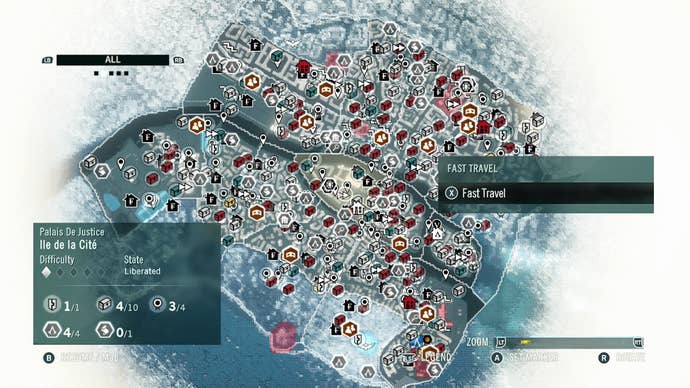
Collecting All the Things
Examples: Assassin's Creed Unity
Item collection has always been a facet of open-world titles, giving players a reason to explore the robust areas developers have created. Generally, you don't need to collect all items to progress, but games generally reward you with special weapons, costumes, or abilities for sticking to it.
If there's an upper limit to the amount of collectible items you can have in a game, Assassin's Creed Unity is definitely butting up against it. Opening up the map in Unity means subjecting yourself to a deluge of icons, showing you all the various things you can do and collect. Even with the built-in filters, it can be a bit overwhelming.
Add too many things to do and the world feels bloated. One of my favorite open-world games, Sleeping Dogs, showed that you can fill a world with things to do and collect without going too far. Developers should strive to make each action or item more meaningful. One of the ways that can happen is by simply having less. We don't need to collect 50 feathers or crystals, you can probably get away with 20; the collection aspect remains, but it's not made to feel tedious.
And that's before you get to Unity locking chests behind AC Initiates or the Companion app. So annoying.
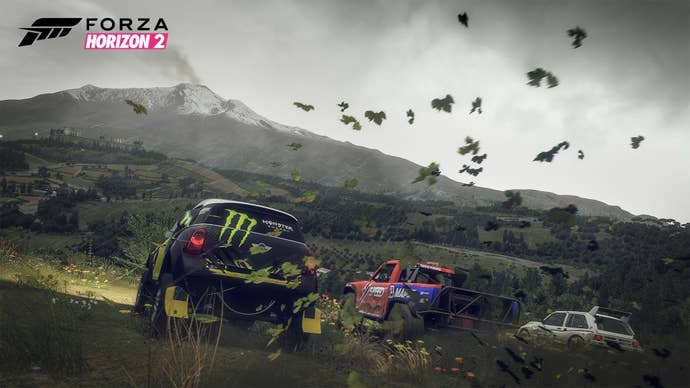
Bleeding Between the Lines
Examples: The Crew, Forza Horizon 2, Dragon Age: Inquisition
This year also saw the idea of the open-world reaching into other genres. The Crew is a car-based MMO, but it's also the application of Ubisoft's open-world knowledge to the racing arena. Radio towers replace forts or towers in other Ubisoft titles, you drive to these towers to unlock new missions and challenges in each area. There's even landmarks, giving you a cinematic view of various parts in each city. As such, The Crew has the same early gameplay loop as other Ubisoft games. It's an interesting concept, but one that developer Ivory Tower doesn't quite pull off.
Playground Games did a far better job with Forza Horizon 2, which lets players cruise around a beautiful island. The game plays in a similar manner to The Crew, but it's less in-your-face about all the things you can do. Just racing around the island feels fun and freeing, like the best open-world games do. Its recent expansion, Storm Island, gives you another island to explore, albiet with a different kind of beauty.
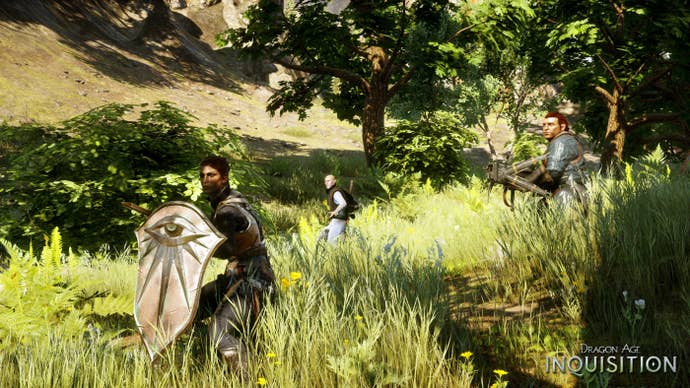
Dragon Age Inquisition has specific discrete areas separated by loading screens, thus making it not really an open-world title, but it shares enough of the DNA. Areas like The Hinterlands certainly feel like an open-world environment, offering vast stretches of land for players to explore and unlock. These stretches are filled with story missions, side quests, and small items to collect, just like any open-world title. Bob noted the open-world leanings of Dragon Age Inquisition in his preview.
The open-world is a concept that can be brought to almost any genre. It's mostly applied to action-adventure games, but there's nothing really keeping it within those confines. The open-world can come to RPGs, Tactics games, first-person shooters, puzzle games and more. It's about expanding gameplay beyond the idea of discrete spaces. An open world isn't right for every game, but it's an idea that can be explored a bit more, stretched and twisted to fit in new places.
As we head in 2015, developers continue these experiments in open world-building. We already have No Man's Sky, Batman: Arkham Knight, Bloodborne, The Witcher 3: Wild Hunt, Mad Max, Just Cause 3, and Assassin's Creed Victory on the horizon, and that's without reaching big announcements at E3 and Gamescom. There's still life left in the open-world concept, but I'm not quite sure where that life is headed. Looking forward to finding out.

